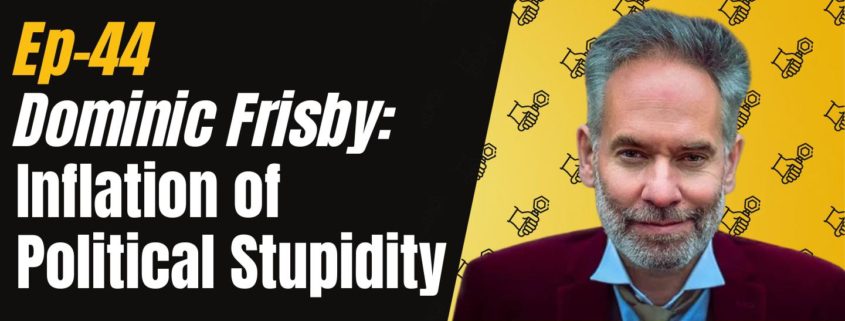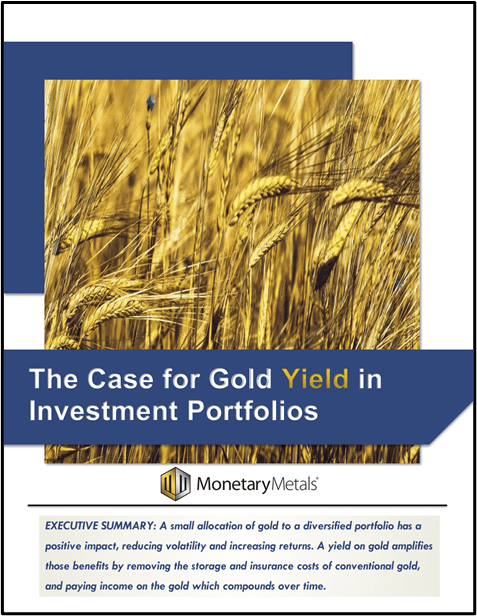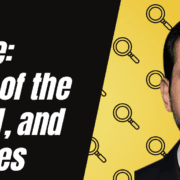Ep 44 – Dominic Frisby: Inflation of Political Stupidity
Comedian, commentator, and author Dominic Frisby joins Ben and Keith LIVE in New Orleans for a special edition of the Gold Exchange podcast. Dominic untangles the mess that’s happening in the UK including the movements in the pound and gilt markets as well as their latest tax and energy policies. With Liz Truss stepping down today as the UK’s Prime Minister, you’ll want to listen in to what Dominic has to say.
Connect with Dominic on Twitter @DominicFrisby and on his Substack
Connect with Keith Weiner and Monetary Metals on Twitter: @RealKeithWeiner @Monetary_Metals
Additional Resources
Will Rate Hikes Fix Inflation Article
Earn Interest on Gold and Silver
Podcast Chapters
13:11–17:03 Rising Nationalism
20:04–28:10 Brexit and Sovereignty
28:10–29:57 Recession and Definitions
Transcript:
Benjamin Nadelstein:
Welcome back to the Gold Exchange Podcast. My name is Benjamin Nadelstein. We are here at the New Orleans conference with founder and CEO of Monetary Metals, Keith Weiner, and our special guest Dominic Frisby, author, commentator, and one of the funniest guys we know. Dominic, pleasure to have you.
Dominic Frisby:
Thank you very much for having me, folks. Pleasure to be here.
Benjamin Nadelstein:
Dominic, I hate to be the bearer of bad news, but I just found out British Finance Minister quasi quarter out six weeks after the job fired. What do you have to do?
Dominic Frisby:
Yeah, well, he was the Chancellor of the Exchequer and I’ve got to say I really liked his budget. We got a new Prime Minister and a new Chancellor, as you probably know, about a month ago, six weeks ago, and they surprised everyone with their first budget because they did that heinous thing of slashing income tax and they slashed corporation tax and they tied it up a load of other things as well. And I’m a low tax guy. I believe economies are more productive, the lower taxes and populations are more inventive and innovative and so on in low tax jurisdictions. And I think there’s a correlation between tax and freedom and the lower tax, the more free people are and all that. So I quite liked his budget, but it totally took the markets by surprise and the gilt market in particular was hit. But what goes unreported in this whole story, and it really makes me cross, is that in the UK, quartz budget got the blame for the collapse in the guilt markets. But if you actually look at a chart of the gilt markets, you’ll see that the collapse in the gilt markets began the day before Ten’s budget.
And what had happened is on the previous Tuesday, so the budget was on the Friday, the collapse began on the Thursday, but on the Tuesday the bank of England published their guilt sales and they announced quantitative tightening. So whereas for the last since 2008 the bank of England has been printing money and buying bonds, or gilts as we call them, they suddenly turn around and say, no, we’re selling this many gilts and this is the amount we’re going to sell and we’re going to sell them over this time frame. Now, you may remember they did exactly the same thing with gold in 1999 and they published all their gold sales to the market. A few things about that tank the gold market and it’s because they’ve obviously got some protocol or whatever they have to announce their sales. But that’s not what you do if you’re trying to get the best price for your product. You don’t broadcast your sales or your purchases in advance. And that is what began the tanking and guilt market. But then because this trustworthy budget was essentially a low tax kind of, I suppose you’d call it neo Thatcherite thing, neo Reageanite thing, all their ideological enemies, their political opponents, which dominate in the media, just swarmed all over it.
Nobody was expecting it, which made them even more angry because they didn’t get all the leaks beforehand. And so he was blamed and all the panic that ensued in the financial markets and the bank of England got off scot free. And then at the first sign of panic, the bank of England started printing again, the very first sign of panic. So that just shows you the default thing is print. When in doubt, print printer is coming. So I’m sorry to see Kwartang go. I’m a pro low tax guy. And now the problem is, what has happened is that slashing corporation tax and slashing income tax has now become toxic, politically toxic, and no government minister with any kind of ambition whatsoever is going to attempt to do that for probably another 20 or 30 years. So our little moment. Like one of the reasons I voted for Brexit was because I thought we could turn ourselves into Singapore on Thames. Into a low tax free entrepreneurial. Blah. Blah. Blah. On the edge of Europe. Between Europe and America. Between Asia and America. All this stuff. And. You know. Basically enjoy a similar boom to the one we had in the put the UK back on the map.
But I’m afraid now we’ve just turned ourselves into a large government and what we’re learning at the moment is if you can print money in America. If you are energy independent. Which America for the most part is. But you cannot print money and be energy dependent. Which is what Europe is. Which is what Japan is. And that’s why there’s this huge gulf in the dollar and the European currencies and the Japanese currency. You can’t and we could be energy independent, but we’re not because of short sighted policy and too much power and influence exerted by anti fossil fuel bodies. And so the UK now has really serious problems and I thought that budget was a potential root out of them. She’s gambling on growth to solve our stuff, but we’re not going to get the growth now. And UK anemia continues. We’ve got big problems.
Benjamin Nadelstein:
We’ve got big problems as maybe an understatement, which is kind of scary. Let’s talk about energy policy for a second. Keith, I know you wrote a lot about these kind of two different policies that were undertaken that really undermined energy stability and energy independence. Why don’t we walk through that for.
Keith Weiner:
A second in the UK? So I think it was around 2017 or 2018, they passed two stupid laws. One, forcing all, or maybe not all, but most of the heavy energy users to switch from oil and coal to natural gas, and the other one prohibiting domestic production of natural gas via fracking, which is basically that’s how you produce natural gas. So you can’t produce it anymore domestically and everybody who’s not using it has to switch to it. Then you get the perfect storm of the logistics and shipping snafus of lockdown and whiplash due to COVID and suddenly you can’t import the natural gas anymore. And at the same time, obviously woes with Russia and the price of natural gas guy Rocket ten X or something like that, shutting down fertilizer production domestically in the UK, which is going to cause horrible food skyrocketing. And the point I usually make is that people call this inflation, but it isn’t monetary. But I think in this context of.
Dominic Frisby:
Inflation, of stupidity, right, but in this.
Keith Weiner:
Context, it’s just contributing to the general political woes of the UK.
Dominic Frisby:
We have enough natural gas under Lancashire and Yorkshire, which is in the north of Britain, north of England, to not only be energy independent, we could be exported, we’ve got the natural gas there, but instead we’ve chosen to import it. Now, this is how stupid it is because part, you know, you look at all the forecasts and even with all the net zero and trying to go green and renewables and all the rest of it, demand for fossil fuels is only going to stop increasing by after 2030, so demand is going to carry on growing until 2030 and yet nothing has been spent on production. So that means the price can only go one way, but the idea that it is somehow greener not to produce so in this world in which we need fossil fuels, the idea that it’s somehow less green, not to produce it at home, where we can oversee it and do it responsibly, but instead to import it from wherever Russia or wherever it is. And the idea that they’re going to do it in a more green way than we are, they’re not. So what they’re doing is they’re going, we don’t want the pollution, we don’t want the environmental fallout, but because it’s out of sight and out of mind, therefore it doesn’t exist, I’m sorry, it still goes up into the atmosphere.
Dominic Frisby:
It doesn’t matter whether it goes via Qatar or via Russia or wherever it goes up via, it still goes up there. So you may as well do it yourself and do it more cleanly and create a load of jobs and then not be dependent on questionable regimes for your energy policy. It’s just done on a green level, it’s done on an economic level, it’s done on a financial level and it’s done on a moral level.
Benjamin Nadelstein:
Couldn’t say it better.
Keith Weiner:
Green is done on an economic and a moral level.
Dominic Frisby:
Often the intention is right, but the road to hell is paid with good intentions, as a famous economist once said.
Benjamin Nadelstein:
Well, let’s go there on these kind of good intentions. So obviously inflation is high, but we just kind of went through some non monetary factors that are contributing to these high prices and this inflation. Now we’ve got an even worse factor, which is rate hikes. This is going to, quote, destroy demand. That’s what the Fed and these other banks are saying. We need to tamp down demands. But that’s jobs, that’s corporations. And let’s talk about a power plant or a fracking plant. Those need to be made. And that doesn’t happen in the snap of the fingers, especially with high rates. So what do you think? With high rate hikes, I don’t see how this energy crisis is going to be evaded. If anything, it’s probably going to get worse. Is that right, Keith?
Keith Weiner:
Yeah. Well, my theory is that the interest rates is one of the most important costs in producing, especially putting something new into production. If you hike rates, you have to wait for prices to rise to get a bigger profit margin before a project is profitable. So if your only concern was rising prices and you didn’t care about any of the other economic damages caused by falling rates, you’d want falling rates because it’s a rising subsidy for producers. Now we have rising rates, which means cost of produce go up, which means plants and mines and wells are delayed, which means further pressure on upward pressure on prices.
Dominic Frisby:
Yeah, I mean, interest rates is basically the government setting the price of money or the central bank setting the price of money. And if they set the price of money high, the money is going to get more expensive. So people are going to borrow less, which means less investment. But let’s face facts, they didn’t invest money in fossil fuels and mining even when it was cheap. But what annoys me about inflation is it used to be the definition of inflation was you inflate, you blow up the money supply with the consequence of higher prices. Then inflation came to mean simply higher prices. Now inflation just means higher prices in a certain basket of goods and services, which for the most part are prone to the deflationary forces of increased productivity, and China exporting its cheap labor and all the rest of it. Now, if you included, for example, house prices, like if you look at house prices in the UK, between 1997 and 2007, the housing stock grew by 10%, okay? And the population grew by 5%. So if house prices were purely a function of supply and demand and population, they should have fallen slightly over the period.
They didn’t. They went up by over 300%. Okay? And then you look at money supply growth over the same period and that increased by 300%. So house prices are a direct reflection, not in the dynamics of what’s going on on the ground, but there is reflection and money supply growth, but they don’t include house prices in their measures of inflation. Now, if they’d had ten to 15% annual house price inflation in their measures of inflation, interest rates would have gone up a lot quicker, a lot sooner, but they didn’t include them because it meant they could print money. Similarly, you look at inflation in the stock market, financial assets, gold, bonds, price and so on. If they were included in measures of inflation, then interest rates would be a lot higher, but they’re not. So they print money and they say, oh, look, everything’s great. It’s like 13% of money, of newly created money, goes into the sector in question, which, apart from anything else, is pro to the deflationary force of globalization and cheap Chinese labor and all the rest of it. Well, now that’s going because we’re living in a deglobalized world of COVID and supply chains and all the rest of it, and suddenly nobody can understand why there’s inflation.
Well, I don’t agree with your definition of inflation.
Keith Weiner:
We talk a lot about globalization, and the other word for that would be rising nationalism is, I think, a very worrying trend. So much of the quality of life we enjoy in Western countries comes from the ability, the New Zealanders kind of figure this out in the 1980s, that all this protectionism, because they didn’t think New Zealand farms would be competitive against, I think, British farms. And somebody kind of read Adam Smith and said, Law of comparative advantage. They simply have better pasture land, particularly for sheep and lambs. So isn’t today most lamb and wool imported from New Zealand, even in the UK, not to mention in the US, new Zealand lamb. And one by one, as these exports or imports turn off, we’re going to see rising prices because things become genuinely scarcer. And, you know, in America in particular, there’s this attitude that we don’t need import, we’re America, we can make everything, we’re a big market. Well, when you have to produce things at the scale only for sale and purchase in America, there’s going to be a lot less of a lot of things, and what’s left is going to be much more expensive, let alone in smaller countries like the UK, where things become scarce and impossible to obtain.
Most markets have a certain minimum scale. I think semiconductors, the idea of semiconductors being designed and manufactured locally, just for sale within your city, is absurd. Those are global businesses, and if they’re forced to shrink down and become only a national business, we’re going to find that computer chips go back to what they used to cost in the 1980s, when and even then it was a global market, and it won’t be very good much lower. Right.
Dominic Frisby:
We need vast amounts of lamb in the UK and we have vast amounts of New Zealand lamb. And I think New Zealand is literally on the other side of the world to where the UK is typically yes. Right. And you kind of think, surely it’s cheaper to just import Welsh lamb or even English lamb. It’s not like there’s a shortage of sheep in the UK, there are loads of them, but it obviously works. But the problem I have is that one of the reasons that we outsource so much production to places like China or wherever it is, is that the cost of government is much smaller there. And so, for example, you look at industry, we nationalize a lot of industry during the war and then after the war, and then the unions were holding the government to account and meant wages were not too high, and in the end, they had to close down the coal mines and the steel making industry. We have a rich history of industry in the UK. If the cost of government was much smaller, then a lot of those industries could survive and compete with China and the rest of the world.
Dominic Frisby:
But because our cost of government is so high in the UK, they can’t. And the way the consumer has benefited is because of Chinese exports, or wherever it is exports. You can avoid that cost of government. The cost gets driven down and the local business goes bust. But the local business, in a world of nationalization, the local business can’t start up again because the cost of government is still there. And you get a guy, we’re back to where we were, we’ve got trust and quarter. They’re small tax, low tax, small government guys. They were trying to slashing corporation tax. Slashing these taxes were an attempt to make Britain competitive by slashing the cost of government, and that’s gone now.
Benjamin Nadelstein:
Well, I want to get to your book. So you wrote this book, Daylight Robbery, right? We’re talking about taxes now. There was at one point, I remember, a discussion of having a kind of global tax rate. Hey, everyone, here’s the issue. There’s a race to the bottom. If the UK has lower tax rates than the US, well, companies are going to flee to the UK. Now, that was described as a race to the bottom.
Keith Weiner:
They’ve just got the direction wrong.
Benjamin Nadelstein:
Yeah, I think you’ve got the direction wrong, guys. So there was this discussion at some point to have a kind of global discuss tax rate, everyone will do 15%, so there’s nowhere to hide. Let’s talk about taxes. I mean, there’s Daylight Robbery has described they’re a huge burden. What can you tell us about taxes?
Dominic Frisby:
Well, they try to impose international taxes and agree on them, but because every political part, every government in every country is at a different rate stage in their electoral cycle and they’re trying to make themselves popular or whatever, and they often have different ideologies. You might have a left wing government in one place, or right wing government, or else it’s very hard to get people to agree. And so you’ve got these kind of supra national organizations, the IMF and various others, but they struggle to get people to agree. So I think we’re a way off that. But I do think it’s sort of going to come by the back door a little bit as we go into international money, IMF, SDRs and all that inflation and printing money is just another tax, albeit by the back door. The European Union is trying to centralize the collection of VAT, which would be your sales tax in Brussels, and it’s trying to set it there so that each government body can’t, each nation can’t set its own tax policy. If it centralizes it there, that will be a step in that direction. They also tried to impose they didn’t get it through, but they tried to impose their digital what was it called?
The digital tax on Google and all those international things, I think was 2%, whatever it was, and that would be a centralized tax in Brussels. So Brussels is very much a centralizing force. I argue that tax is power, and it is because if a ruler loses its tax revenue, it loses its power, whether that ruler is a king and emperor of government, whatever. And so by centralizing tax collection and tax policy in Brussels, they’re trying to centralize power in Brussels. They haven’t made that work yet, but you can bet your bottom they’re trying. And fortunately, they haven’t made it work internationally. But given how much power like that, a body like that has an international health policy, I guess it’s not going to be that long before they have a similar amount of thing on international tax policy. But we’re aware of that at the moment.
Keith Weiner:
You’re thinking in the UK, given the sentiment for Brexit and then that Brexit happened, but perhaps not in the way that a lot of the Brexit ears expected, do you think that there’s an increasing or decreasing support or sentiment for having a supernational body that dictates local policy?
Dominic Frisby:
Well, one of the reasons a lot of people voted for Brexit was the number one given reason was sovereignty, and we wanted to make our own laws and set our own policy and all that kind of thing. And a big subset of sovereignty is immigration. We’ve seen incredible levels of immigration into the UK in the last 20 or 30 years, and people feel threatened by it, they feel scared by it, they feel their national identity is being eroded by it. What tends to happen is that for example, in the media, you’ll see loads of national people, indigenous people, overlooked in favor of the immigrant. You just see different sets of rules for different sets of people, and it’s made a lot of people very angry and very concerned and very frightened. And what’s happened since Brexit is that whereas the immigration previously was coming from Europe, now instead of going, right, we’re going to lower levels of immigrants. Because one of the reasons there’s so much anger is that the local worker was working. At one rate, the immigrant labor comes in and works at a cheaper rate, the local labor gets put out of business, he either ends up unemployed or he has to work at the lower rate. And so you get this increasing gap between rich and poor, and that’s what made a lot of people angry. Now, I’m aware that there’s lots of different dynamics going on and some you will agree with and some you won’t. But what’s happened is, instead of they’re now relying on cheaper labor coming in from Europe, it’s now coming in from the rest of the world, so it’s coming in from Africa and Asia, and that’s made everyone feel even more threatened and so on.
Now, you may say this is a good thing, you may say it’s a bad thing, whatever, but a lot of people are going, no, you’ve taken one thing and made it worse. So people do feel frightened. And you look at areas of the UK, famous English cities, they’re unrecognizable from what they were 10, 15, 20 years ago, unrecognizable in terms of the demographics. People don’t like it. They feel their cultural identity is being destroyed. And so I do think the polls now show that, given the choice again, and given how bricks it’s been handled and given what’s happened with immigration since, a lot of people will go, actually, no, we shouldn’t have voted for it. But I don’t blame people for voting for Brexit for that. I blame the way Brexit has been handled and the way that those people just are not represented politically.
Keith Weiner:
Do you think appetite for sovereignty over policies, and in particular tax and monetary policy, do you think appetite for that sovereignty will increase or decrease as a result of the fallout?
Dominic Frisby:
I think the problem with British politics, you can’t reform it because of the twoparty system we have in the country. Other parties have come along and they’ve attempted and they’ve never been able to win any seats in a general election. Even Faraj, you know, probably the most famous British politician in the last 30 years. He was never an elected MP, he never got into Parliament MEP, but whatever. He was never an MP, never a Member of Parliament, and he was able to exert incredible influence on the sidelines and influence Tory policy. And he kind of made Brexit happen, but he must be looking at how it’s been managed and just in the fit of despair, because what people wanted to happen has not been delivered. And there is a huge gulf in what people want and what politicians are doing. I would say over 50% of the British population feel unrepresented. So there is a gap for another party, but it cannot happen while we have the political system that we have. But the Tories now are so incredibly unpopular. They’re like, more unpopular than anyone ever. They’re more unpopular than more unpopular than Texas.
I was trying to think of a celebrity. They’re more unpopular than Bill Cosby or something. They’re just like incredibly unpopular.
Keith Weiner:
I see some similarities and some differences between the US.
Dominic Frisby:
Do you have a third party in the US?
Keith Weiner:
You can’t no, our system, it’s rigged. I wouldn’t say rigged, I would say the US system. The coalitions have to form up fronts by which groups subscribe to which parties, whereas in the parliamentary system you have these different parties and then the coalition’s farm the Greens and the Scottish Nationalists and whatever form later. And sometimes you get a surprising coalition to form a government in the US. The strange bedfellows occur up front. Everyone knows what the Republicans, what you get are Democrats. But I was going to get my.
Dominic Frisby:
Comment and I think probably the Conservative Party is not unlike the Republican Party. It’s basically a coalition. You’ve got Social Democrats on the left of the Conservative Party and you’ve got hard core Libertarians on the right of.
Keith Weiner:
It, except that you’re libertarian, right is pro monarchy. The Americans totally don’t get that. But I was just going to make a very simple quip.
Dominic Frisby:
You should have stuck with this guy.
Benjamin Nadelstein:
Maybe you can buy a pack or.
Keith Weiner:
Maybe that ship has sailed. But I was just going to make a very simple step. Whichever party is the one that is most recently offended the majority of the electorate, which usually means the one that’s in power becomes the one that’s most hated. And so the other party is not loved, but they’re simply less hated than the incumbents. And so it’s the 2010 well, 2008, bush, McCain, everything was just perceived to be so bad. We have the left and so we have the Democrats in 2010, Obamacare highly unpopular, a bunch of other things sweep the Republicans in and the pendulum swings based on which party has offended you most recently.
Dominic Frisby:
That’s how ours works. But unfortunately, whichever one you elect, politics seems to get steadily worse and government grows, just never stops growing. And we seem to be living in now where the UK is governed by talking heads on Twitter and focus groups and polling and the media, and so the media will attack the government whatever it does. So we’ve had six, seven, whatever. How many more than that? Years of Tory, but it’s basically been the Tories pandering to the center. So I’m almost hoping that labor far left government gets elected because that’s the only way we can have a libertarian policies imposed, because the media will just take the other side of the far left government and the far left government do everything it can to pan into the media and you end up with a libertarian outcome. That’s the last.
Keith Weiner:
Is more odious and more obviously bad because they’re like anti the country, anti the people. They’re just really nasty. If you get a I don’t know what Jeremy Corbyn is or what’s his name, galway or Galloway.
Dominic Frisby:
Galloway. Galloway is all right, good guy, odd.
Keith Weiner:
All these odious fellows.
Dominic Frisby:
This is honest about his politics.
Keith Weiner:
That could cause people to wait a minute, there was something about the Tories that.
Dominic Frisby:
We can tell you what a woman is. The current Labor Administration can’t agree on what a woman is.
Benjamin Nadelstein:
Well, actually, let’s talk about the definition real quick. It seems like in America we can’t agree on what a recession is. Are we in one, or is there even such a thing as a recession anymore? Obviously, we’ve had two falling quarters of GDP that’s no longer a recession. Apparently, we’ve been joking that there was an old bed chair and he was ordered by the President not to say the word recession. So instead he said, I’m not going to say recession, but I will say banana every time I mean recession. So are we in a recession? Are we in a banana? And, yeah, this kind of playing with definitions, you would think that with your point about the media. The question is, if we had two consecutive falling GDP, would that not be called a recession if another person wasn’t power? I think the answer is pretty obvious there.
Dominic Frisby:
Well, it’s so academic and it’s a bit like inflation. It almost doesn’t matter how you define it, because it means different things to different people and it’s an academic definition that the media will jump on to. But we’re certainly in a time of falling productivity, whether it’s recession or not, we must have gone into recession in COVID. But was it only one quarter, maybe?
Benjamin Nadelstein:
Well, I think there was a big hit and they did their one policy move, their one trick pony. Get that money in there.
Dominic Frisby:
Yeah. Really? Yes. I can’t answer that question because it’s stupid definitions and I don’t care.
Benjamin Nadelstein:
Well, I think you’re right. Listen, and I don’t care. What I know is that government’s growing.
If I lose my job, the government debt grows and everything is more expensive. You can call it whatever you want, you can call it banana, recession, inflation, I don’t care. It’s hurting the average citizen. Right. And it’s a real problem. So, before we end, I’ll have one more question for you, but where can we find all of your great work? Obviously, we want to hear more about what you’re doing.
Dominic Frisby:
Well, thank you very much. I write a newsletter on substack and so it’s called The Flying Frisby and the web address is frisby.Substack.com. My surname is Frisby. Frisby. And 80% of the stuff 90% of the stuff I put out is free. And then there’s a paid option if you want to get, like, mining tips and see what I’m doing in my portfolio, which at the moment, I’m just trying not to drown. But that’s my newsletter, Frisby@Substack.com.
Benjamin Nadelstein:
And so I want to end here with the New Orleans investment conference. What is some of the best investing advice that you’ve either received, you want to give us, or maybe you. Want to give the government here. What should we tell people? What’s some advice that we can get?
Dominic Frisby:
Well, the best piece of investment advice I was ever given was in 2011, and it was by bitcoin by bitcoin by bitcoin.
Benjamin Nadelstein:
All right, well, maybe we’ll lie some bitcoin as we end the conference. Thank you, Dominic, so much. We love to have you.
Dominic Frisby:
Thank you.
Additional Resources for Earning Interest on Gold
If you’d like to learn more about how to earn interest on gold with Monetary Metals, check out the following resources:
In this paper we look at how conventional gold holdings stack up to Monetary Metals Investments, which offer a Yield on Gold, Paid in Gold®. We compare retail coins, vault storage, the popular ETF – GLD, and mining stocks against Monetary Metals’ True Gold Leases.
The Case for Gold Yield in Investment Portfolios
Adding gold to a diversified portfolio of assets reduces volatility and increases returns. But how much and what about the ongoing costs? What changes when gold pays a yield? This paper answers those questions using data going back to 1972.












Leave a Reply
Want to join the discussion?Feel free to contribute!